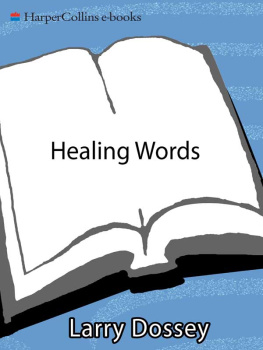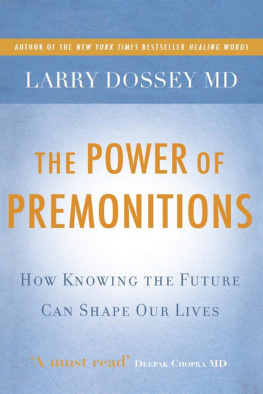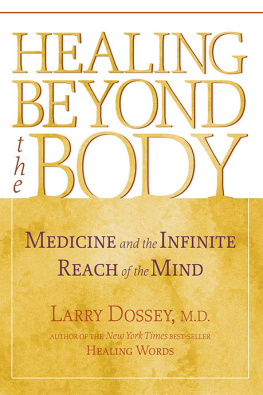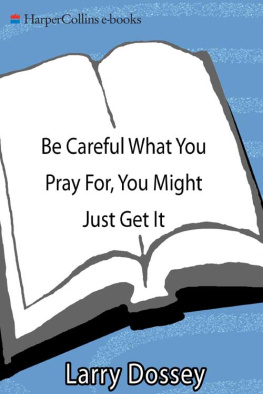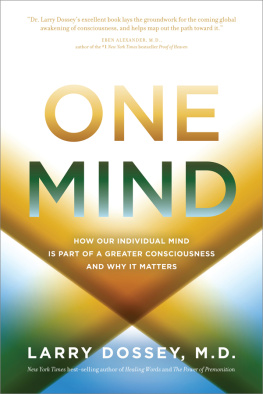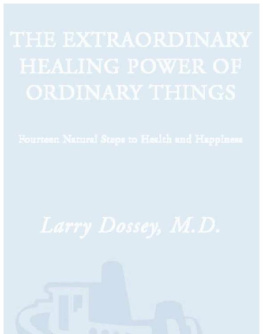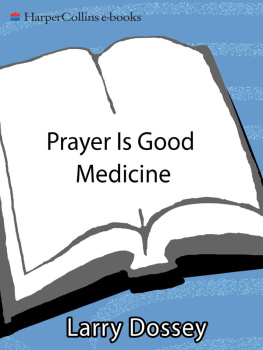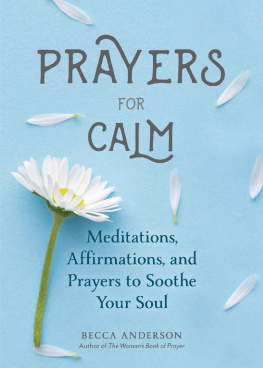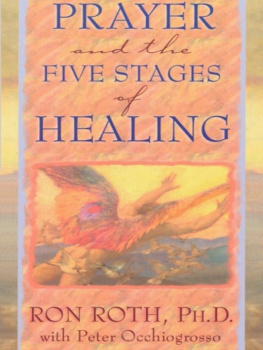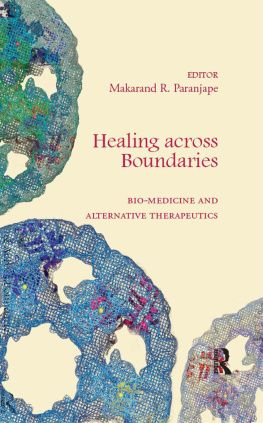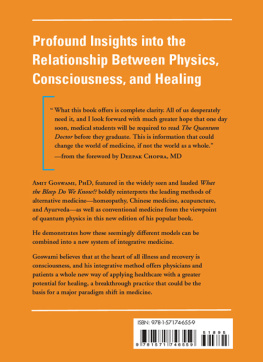Larry Dossey - Healing Words
Here you can read online Larry Dossey - Healing Words full text of the book (entire story) in english for free. Download pdf and epub, get meaning, cover and reviews about this ebook. year: 2011, publisher: HarperCollins, genre: Religion. Description of the work, (preface) as well as reviews are available. Best literature library LitArk.com created for fans of good reading and offers a wide selection of genres:
Romance novel
Science fiction
Adventure
Detective
Science
History
Home and family
Prose
Art
Politics
Computer
Non-fiction
Religion
Business
Children
Humor
Choose a favorite category and find really read worthwhile books. Enjoy immersion in the world of imagination, feel the emotions of the characters or learn something new for yourself, make an fascinating discovery.
- Book:Healing Words
- Author:
- Publisher:HarperCollins
- Genre:
- Year:2011
- Rating:3 / 5
- Favourites:Add to favourites
- Your mark:
- 60
- 1
- 2
- 3
- 4
- 5
Healing Words: summary, description and annotation
We offer to read an annotation, description, summary or preface (depends on what the author of the book "Healing Words" wrote himself). If you haven't found the necessary information about the book — write in the comments, we will try to find it.
Proving prayer to be as valid and vital a healing tool as drugs or surgery, the bestselling author of Meaning & Medicine and Recovering the Soul offers a bold integration of science and spirituality.
Healing Words — read online for free the complete book (whole text) full work
Below is the text of the book, divided by pages. System saving the place of the last page read, allows you to conveniently read the book "Healing Words" online for free, without having to search again every time where you left off. Put a bookmark, and you can go to the page where you finished reading at any time.
Font size:
Interval:
Bookmark:

For Garry and Bet
Truly, it was to our amazement that the ailing said they were well. Being
Europeans, we thought we had given away to doctors and priests our
ability to heal. But here it was, still in our possession. It was ours
after all, we were more than we had thought we were.
Alvar Nuez Cabeza de Vaca to the king of Spain, early sixteenth century
I have used a variety of terms throughout this book to refer to a Supreme Being. In most cases I have chosen as neutral a term as possible, such as the Absolute.
I tend to agree with those wise teachers who say that all the names of God are misleading. As all the major esoteric wisdom traditions tell us, the Absolute cannot be spoken or thought. We simply have no reliable pictures of the Almighty. As the Sufi aphorism soberly states, No man has seen God and lived.
In the fourteenth century, an anonymous English monk, believed to be the author of The Cloud of Unknowing , an exalted religious tract that deeply influenced the religious life of the time, added his lament to the futility of addressing and even thinking about the Universal. But now you will ask me, said he, How am I to think of God himself, and what is he? and I cannot answer you except to say I do not know! For with this question you have brought me into the cloud of unknowing. [O]f God himself can no man think.
As the great thirteenth-century German mystic Meister Eckhart observed, Whoever perceives something in God and attaches thereby some name to him, that is not God. God is ineffable.
At this moment in history, in which were experiencing a much-needed awakening of feminine values, perhaps it is important to point out that the problem of naming the Absolute is not resolved merely by replacing all the masculine names and pronouns with feminine ones. God and Goddess, he and she, founder equally. The Absolute is radically beyond any description whatsoever, including gender.
With these limitations in mind, the reader may insert, in every instance that follows, his or her preferred name for the Absolutewhether Goddess, God, Allah, Krishna, Brahman, the Tao, the Universal Mind, the Almighty, Alpha and Omega, the One.
A few years ago, I was surprised to discover a single scientific study that strongly supported the power of prayer in getting well. Because Id never heard of controlled experiments affirming prayer, I assumed this study stood alone. But did it? Somehow I could not let the matter rest, and I began to probe the scientific literature for further proof of prayers efficacy. I found an enormous body of evidence: over one hundred experiments exhibiting the criteria of good science, many conducted under stringent laboratory conditions, over half of which showed that prayer brings about significant changes in a variety of living beings.
I was astonished. I had begun my search believing it would turn up little. After all, if scientific proof for the healing effects of prayer existed, surely it would be common knowledge among scientifically trained physicians. I came to realize the truth of what many historians of science have described: A body of knowledge that does not fit with prevailing ideas can be ignored as if it does not exist, no matter how scientifically valid it may be. Scientists, including physicians, can have blind spots in their vision. The power of prayer, it seemed, was an example.
The question I then had to deal with made me very uncomfortable: What was I personally going to do with this information? Would I ignore it, or allow it to affect the way I practiced medicine? These uncertainties distilled to a single question from which I could not escape: Are you going to pray for your patients or not?
For many years Id ignored prayer. I considered it an arbitrary, optional frill that simply was not in the same league as drugs and surgery. I had in fact tried to escape spiritual or religious influences in healing, fancying myself a scientific physician.
I grew up in a world that no longer existsthe sharecropper, cotton-growing culture of central Texas. Prayer and Protestantism permeated those bleak prairies and, with few exceptions, everyone living on them. The one-room country church, situated forlornly amid cotton fields at a crossroads, was the hub around which life revolved. Alongside the church was the tabernacle, a shingle-roofed, open-air structure used in the steamy, sultry summers for outdoor revival meetings. People gathered at the church twice on Sunday and on Wednesday nights to sing, pray, testify, and hear the preacherusually a young ministerial student from Baylor University in nearby Wacospew forth sermons flavored with hideous and terrifying descriptions of hellfire, damnation, and eternal punishment (sermons about heaven were far less frequent).
As a child I never doubted the truth of what I heard. I took it all seriously. By age fourteen I was the pianist for the tiny church and an eager participant in youth revivals. By age sixteen I was touring as pianist with a traveling gospel quartet, and I played gospel piano as well for an itinerant tent evangelist known all over the state for his fiery earnestness. I planned to become a minister, but aborted at the last moment my plans to attend Baylor University, the worlds largest Baptist school. My twin brother, who is today a retired dentist and a nature mystic, was for some reason blessedly unaffected by all this religious fervor and took a nonchalant attitude toward it. When it came time to leave the farm for college, he convinced me that the wiser course was to enroll in the Universityof Texas, in Austin. Looking back, there were strong omens that this was the right choice. By the time we left for college, the frail, one-room church had begun to lean precariously toward the south, as if pointing the way toward Austin. The tabernacle was actually falling down; the gospel quartet had broken up; and the tent evangelist had been killed in a plane crash.
The university proved my religious undoing. Protestant fundamentalists have always had trouble with scientific materialism, and I was no exception. Under its withering influence, and aided by my discovery of Bertrand Russell, Aldous Huxley, and other intellectual giants, my religious fervor wilted like a central Texas cotton field in September. I became an agnostic.
Medical school followed college, then a stint in the Army as a battalion surgeon in Vietnam. By the time I eventually finished my training in internal medicine and began private practice, I had begun to regrow my spiritual roots. A major event in this process was my discovery during medical school of the philosophies of the East, particularly Buddhism and Taoism. I read widely and insatiably the works of Eastern mystics and Western commentators. I was delightfully surprised to discover that their core teachings were not just Eastern but universal, appearing also in the esoteric traditions of the major Western spiritual traditions. I found that Western mysticism has periodically been just as vibrant as in the East, although not as well known. Feeling the need for a practice in addition to a philosophy, I began to meditate. This was somewhat difficult in Texas in those days. Unlike now, there were scarcely any meditation instructors, teachers, or gurus, and meditation was still a dirty word. But a few wise books on meditative practice had just begun to emerge, and I put their instructions to good use. With immense difficulty and struggle, I gradually adopted an eclectic philosophy that was more spiritually satisfying than anything I had grown up with.
Even so, the experimental data on prayer that I turned up caught me off guard. I really wanted nothing to do with it. Meditation was acceptable, but the thought of talking to God in prayer was reminiscent of the fundamental Protestantism I felt I had laid to rest. Yet the results of the prayer experiments kept forcing themselves into my psyche.
Font size:
Interval:
Bookmark:
Similar books «Healing Words»
Look at similar books to Healing Words. We have selected literature similar in name and meaning in the hope of providing readers with more options to find new, interesting, not yet read works.
Discussion, reviews of the book Healing Words and just readers' own opinions. Leave your comments, write what you think about the work, its meaning or the main characters. Specify what exactly you liked and what you didn't like, and why you think so.

